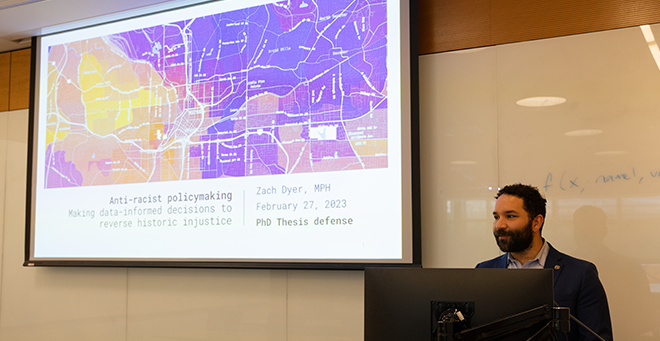
MD/PhD student Zach Dyer spoke about his dissertation research on anti-racist policymaking. Other researchers in the series were Brian Lewis, PhD; Ayorkor Gaba, PsyD; and Natalie Anumba, PhD.
UMass Chan Medical School celebrated Black History Month with a focus on the research of four of its Black scientists: Brain Lewis, PhD, the George F. Booth Chair in the Basic Sciences, professor of molecular, cell & cancer biology, associate dean for diversity and pre-matriculation programs for the Morningside Graduate School of Biomedical Sciences, and assistant vice provost for outreach; Ayorkor Gaba, PsyD, assistant professor of psychiatry; MD/PhD student Zach Dyer; and Natalie Anumba, PhD, associate professor of psychiatry. The series was titled, “Black History Month: A Celebration of Black Excellence at UMass Chan.”
Dr. Lewis, featured first in the series, discussed his research investigating the molecular genetics of pancreatic cancer.
Highlighting well known public figures who have died from pancreatic cancer, Lewis said the work is important because pancreatic cancer is a lethal disease characterized by short survival times and resistance to current therapies. He said the protein mTOR is important for the development of pancreatic tumors. Members of his lab have found that if they impair mTOR activity in mice, the formation of pancreatic tumors is slowed and the survival of the mice is extended. And, when a drug that inhibits mTOR is used, the survival of mice that had pancreatic tumors increases, suggesting that mTOR inhibitors could be part of novel treatment strategies for pancreatic cancer.
“Part of our current work is focused on identifying drugs that cooperate with mTOR inhibitors to block the growth of pancreatic tumors,” Lewis said.
Dr. Gaba, whose passion is clinical work, shared factors that propelled her to shift her approach to looking at treatment research.
“You know you could do great work with individuals and families. But if you're not addressing the full system in which they’re embedded, that work has some limitations,” she said.
In her current work, she seeks to eradicate behavioral health care disparities and advance structural change through a process called equitable implementation that is being adopted by the adult drug court system. Drug courts, which were developed to move people from incarceration to treatment and have been proven to be moderately effective, are seeing disparities as people of color are experiencing barriers that affect their engagement and the possibility of positive outcomes.
Gaba’s research in equitable implementation seeks to establish the mechanisms and community settings a program such as the drug court needs to run well. Her work examines what service is being delivered, why, and for whom, and who has a say in what services are being delivered. Having identified various barriers to implementation, she and her team are working on changes that eradicate them.
Dyer began his presentation with definitions of racial inequity, structural racism and racist/anti-racist policy to convey that health outcomes and social determinants of health are rooted in racial disparities.
Walking the audience through the development of his thesis, Dyer discussed who Medicaid expansion serves or leaves out, how social determinants of health and race affect health care spending, and how racist policies leave scars on neighborhoods by lowering life expectancy over time.
“Racist policies lead to cycles of place-based depression caused by immobility, lack of access to resources and disinvestment,” Dyer said. His research showed that when making policies, measuring neighborhood disadvantage in the context of structural racism, asking questions and taking a race-conscious approach lead to better outcomes.
Dyer serves as the deputy commissioner for Worcester Health and Human Services.
Anumba, who works with state courts to determine a defendant’s mental state at the time of an alleged offense and their competence to stand trial, talked about the racial disparities in the criminal justice system.
Sharing the findings of a report on racial disparities done by the criminal justice policy program at Harvard Law, Anumba noted that people of color are overrepresented in Massachusetts prisons, to an extent that outpaces national numbers. In addition, the report saw an increase in Black men being referred to Bridgewater State Hospital, a facility that is run by the Department of Corrections and not the Department of Mental Health.
For Anumba, change involves looking at bias.
“We as scientists, as practitioners, as clinicians, I think it's fair to say of everyone, we really do try our best to be impartial, comprehensive and complete. However, we are humans, and our capacities are limited, especially in times of stress,” Anumba said.
Abumba’s plea to listeners, particularly her fellow researchers, was to not make science political. “Our methods, results, inferences and conclusions are potentially vulnerable to misunderstanding or even misrepresentation. And in that way, our work could be used as a cudgel to perpetuate oppression and harm.”
She further urged researchers and supporters of science to be vigilant and vocal in speaking to relevant research that will inform good legal decision making.